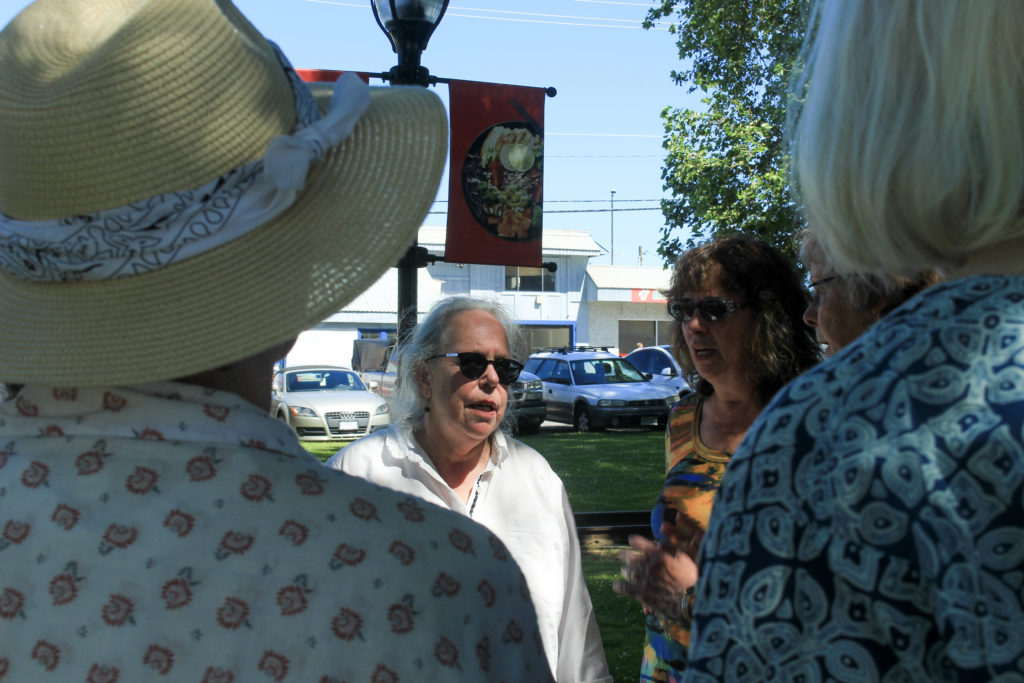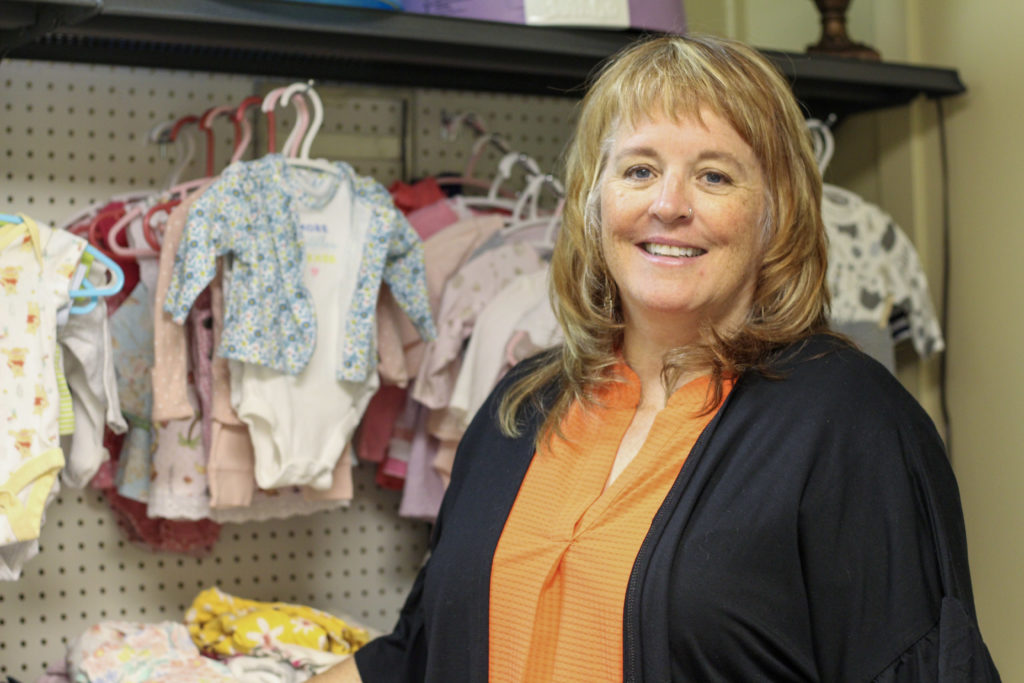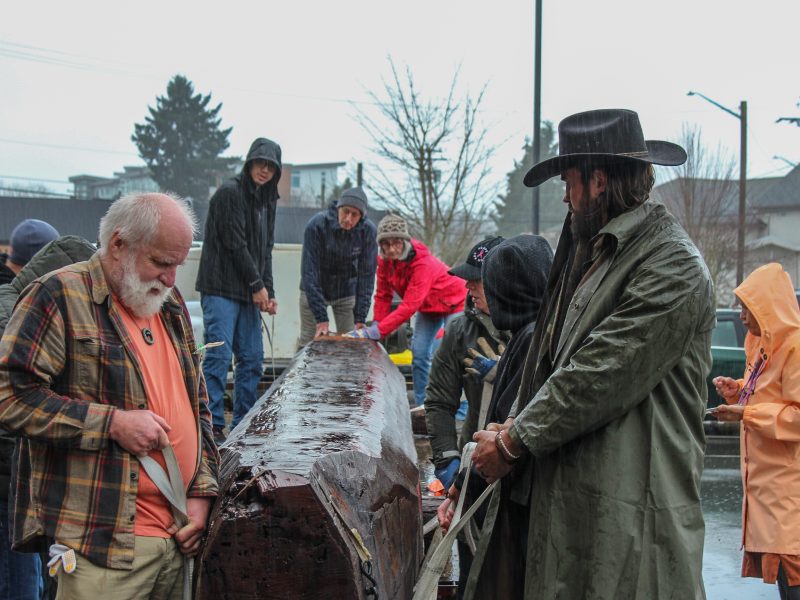
For Rhoda Taylor and several other local abortion rights advocates, June 24 was a double whammy.
Already reeling from the news that morning that the landmark Roe v. Wade abortion ruling had been overturned by the U.S. Supreme Court, Taylor, a retired lactation consultant with a masters in public health and North Cowichan resident, read about the opening of the House of Grace Pregnancy Centre on York Street online. She says the centre’s affiliation with Pregnancy Care Canada, an umbrella network of crisis pregnancy centres long considered “anti-choice” by the abortion rights community, raised “red flags” for her and others about House of Grace’s mission to serve people affected by an unexpected pregnancy.
Taylor worries that the faith-based House of Grace will try to dissuade pregnant women from considering an abortion and thus cause damage in the community.
House of Grace and similar faith-based crisis pregnancy centres operate from the belief that life begins at conception, and will not assist clients in accessing abortions. According to documents shared with The Discourse, the centre is focused on reaching and serving “the abortion vulnerable” and is “committed to assisting individuals carry to term by providing emotional and spiritual support, practical assistance and community referrals.” The centre also commits to “treat all clients with compassion and respect, including women who choose abortion.”
The centre’s executive director, Corina Finlay, contends that it does not try to influence its clients’ decisions.
“Every appointment or opportunity we have to meet with somebody is client-led,” Finlay says. “When you’ve got somebody in front of you in crisis it doesn’t really matter what you believe, you just want to help her.”
Taylor says she suspects that the ruling to overturn Roe v. Wade in the U.S. has contributed to a “groundswell of opposition to the House of Grace clinic opening” in the community. She says people are now connecting to understand more about the centre and respond.
“To say we’re stressed is an understatement,” Taylor says.
Local residents mobilize in opposition to the new pregnancy centre
In early July, Taylor chaired a meeting of an ad hoc group of concerned locals who shared what they had gleaned about House of Grace as well as what they knew about crisis pregnancy centres in other regions.
Mary Annis, a 74-year-old former researcher and board member of the Women’s Resource Centre in Brandon, Manitoba who now lives in the Cowichan Valley, was among those at the meeting.
She says that a crisis pregnancy centre in Brandon affiliated with Pregnancy Care Canada (which had a different name at the time) would drop off pamphlets at the clinic and women’s shelter to encourage women to come in for counselling. “We had a number of women who came in who were very concerned about the information that they received from the crisis pregnancy center,” Annis recalls.

For Annis, it’s déjà vu. In the 1980s and 1990s, she was part of efforts to protect abortion rights. She alleges that crisis pregnancy centres such as House of Grace are impinging upon a woman’s personal choice.
“It’s really important for women to be able to make the choice whether they’re in a position to have a child,” she says, adding. “I really wish I didn’t have to be doing this again.”
Taylor says that the ad hoc group, which is looking into becoming a more formal group, plans to continue airing community members’ concerns about House of Grace through social media. Plans are in the works to organize a planning meeting in the next few weeks, with a larger public meeting in the fall.
The group also plans to compile and disseminate a list of local services available to pregnant women. Taylor contends that House of Grace is not needed in the Cowichan Valley because the services the new pregnancy centre offers already exist in the community through resources like the Healthiest Babies Possible program at the Hiiye’yu Lelum Society House of Friendship, the Margaret Moss Health Unit and Ts’ewultun Health Centre’s Slhexun Sun’ts’a’ Clinic. The Vancouver Island Women’s Clinic also warns people of crisis pregnancy centres on its website.
Island Health and the province also offer online resources for people dealing with an unexpected pregnancy, as does the Options For Sexual Health website.
Finlay, who sits on the board of the Victoria Pregnancy Centre and has worked and volunteered for more than four years at the Crossroads Crisis Pregnancy Centre in Nanaimo says she saw a need for a similar centre in the Cowichan Valley. The Victoria and Nanaimo pregnancy centres are also affiliates of Pregnancy Care Canada.
In addition to peer-led support for those impacted by an unexpected pregnancy, Finlay says House of Grace offers parenting support services up to two years of age.
House of Grace placed on list of ‘anti-choice’ groups
Not long after House of Grace opened, the Abortion Rights Coalition of Canada (ARCC) placed the centre on its list of anti-choice groups in Canada. This is due to House of Grace’s affiliation with Pregnancy Care Canada, says ARCC Executive Director Joyce Arthur.
She has been tracking Pregnancy Care Canada’s (PCC) work for a long time, including in a 2016 study — of which she was one of the authors — that found a majority of crisis pregnancy centre websites lack disclaimers that they don’t refer for abortion or contraception and that some presented medically inaccurate or misleading information.
Arthur worries that everything crisis pregnancy centres do is infused by “traditional biblical morality.”
“The staff might be well meaning and nice and and want to help people, but they have this belief that abortion is bad for women, it’s just naturally bad, it’s going to harm them and it’s not a natural thing to do,” Arthur alleges. “So therefore, it’s going to hurt women to have an abortion. So they’re coming from that belief and then they are trying to help but it’s really based on a false belief.”
She says that this biblical morality isn’t apparent on public-facing materials about crisis pregnancy centres. To help with this, ARCC has produced a “How to Identify Fake Clinics” guide. She says that identifiers include a focus on adoption and phrases such as “you are not alone” and “post-abortion stress,” all of which are found on the House of Grace website.
Pregnancy Care Canada and affiliates do not refer for abortion
Arthur sent Annis and others a 2017 version of PCC’s core documents that affiliate staff and volunteers must sign. The documents include statements of faith and principles, a code of counselling ethics, a stewardship policy, the organization’s commitment to care and competence and volunteer training guidelines. Arthur says the 2017 documents used to appear on the website of the Canadian Association of Pregnancy Support Services (PCC’s former name) but were at some point removed.

Taylor and Annis express concerns that the 2017 core documents reveal an anti-choice agenda that is not reflected in what crisis pregnancy centres, such as House of Grace, present to potential clients.
A line in the statement of principles from 2017 includes: “The affiliate centre does not recommend, provide or refer for abortion or abortifacients. The affiliate centre will not intimidate or judge a woman who chooses in favour of abortion and will treat all clients with honesty, compassion and respect.”
Upon request, PCC sent The Discourse its current core documents that include the updated statement: “PCC-affiliated centres do not provide or assist in arranging abortions or abortifacients. PCC-affiliated centres treat all clients with compassion and respect, including women who choose abortion.”
The core documents also include a sanctity of life statement that proclaims people — from conception to death — have value and worth. The statement says this includes “preborn” (or “unborn” in the 2017 version) children.
A statement of faith adapted from the Evangelical Fellowship of Canada also appears in the documents naming the Holy Scriptures as “the only supreme authority in all matters of faith and conduct.”
House of Grace responds
Corina Finlay is very upfront about House of Grace being “faith-based” and that most of the centre’s support is coming from the local church community. However, Finlay says that being placed on ARCC’s list of anti-choice groups “is a narrow opinion of what we do.”
At House of Grace, equal time is given to the three options for women with an unexpected pregnancy: abortion, adoption and parenting, Finlay explains. She says that while the centre is not a medical clinic, all the information given is medically accurate. Volunteers who do peer-led support at House of Grace did a six-week training with Pregnancy Care Canada earlier this year, Finlay says.

“Our appointments are client-led, so we’re not going to tell her to parent, nor are we going to tell her to adopt, nor would we tell her to abort because it’s her choice,” she says. “So I’m not sure why ‘anti choice’ is woven into that because we believe it is her choice.”
She says that the House of Grace doesn’t refer clients for abortion because that is the purview of a family doctor. She says that they let women considering an abortion know that the centre offers post-abortion support.
“If she chooses to go that route [abortion], then that’s with her family doctor, but we will be there for her on the other side,” she says. “And that’s again her choice, but we are acknowledging that she may need that support.”
Open for dialogue
House of Grace has been reaching out to the local service community in the hope of garnering partnerships that could include sharing clients, Finlay says. She welcomes conversations with people who have concerns “as long as it’s a conversation.”
“With our critics, we might be surprised with that conversation, how close we are in our shared values in the support of this woman and her family, that how close we would be in wanting her best interest at heart,” Finlay says.
One organization interested in having that conversation is Cowichan Women Against Violence Society (CWAV). Jessica Lewinski, CWAV community engagement and development manager, says that her organization’s board president Kristi Koons is hoping to meet in-person with Finlay soon to address concerns about the motivations behind the services offered by the new pregnancy centre.
“We 100-per cent believe in their right to exist as an organization. The only thing that we would ask is that they be 100-per cent honest and upfront about what their intentions are as an organization. So if they are providing ‘pro-life options’, and it is their goal to work with women who want to bring their pregnancies to term, they have every right to do that,” Lewinski says. “But what we would hope as a women-serving organization ourselves is that they are as transparent as possible about that before an already traumatized vulnerable woman walks through their door.”
Lewinski says that in looking into concerns being raised about House of Grace, CWAV has noted a gap in service in the community in that young women may not know where to get support when faced with an unexpected pregnancy. She says that CWAV is assessing what role it can play in filling this gap, including creating stronger relationships with local service providers. [end]



